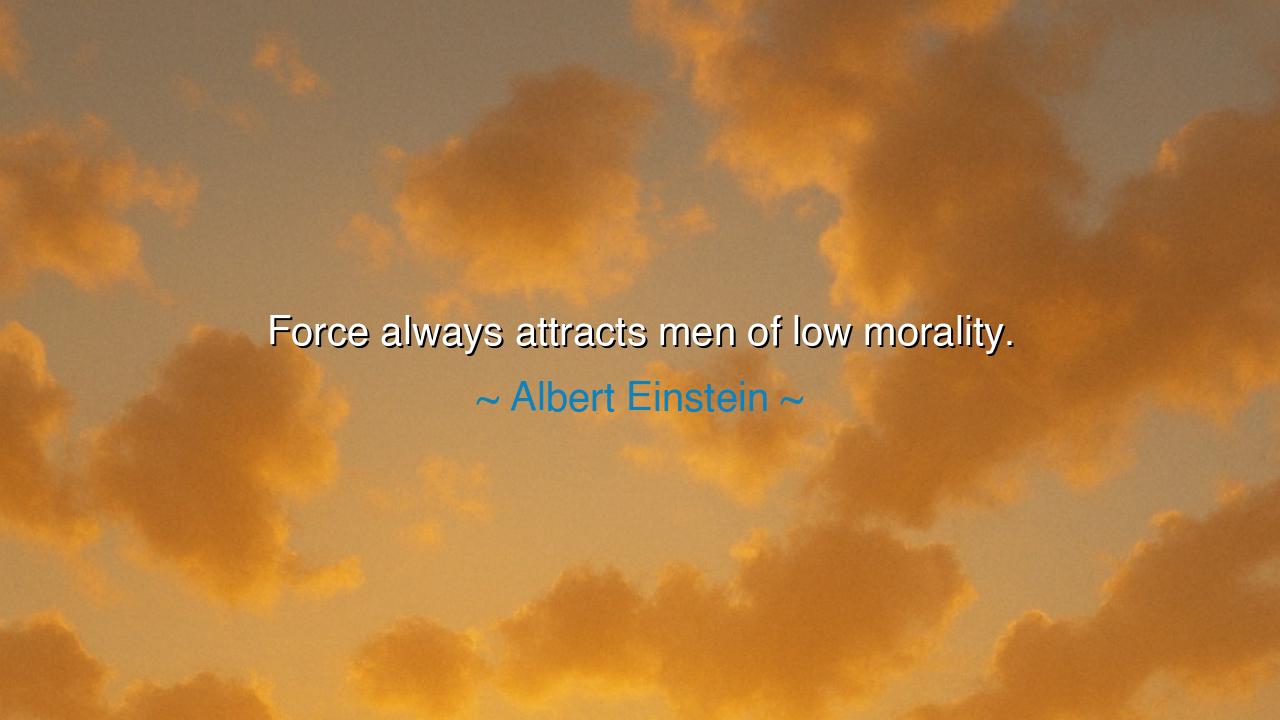
Force always attracts men of low morality.






Gather close, children, for the words I speak come from the lips of a man whose wisdom reached beyond the stars. Albert Einstein, a name known throughout the world for his genius, once said, "Force always attracts men of low morality." These words, though simple, contain a profound understanding of the nature of power and the consequences it has on the soul. They speak to the inherent dangers of force—the way it can corrupt, bend the will, and attract those whose hearts are not guided by the light of virtue, but by the darkness of selfish ambition.
Consider the nature of force, children. It is the compulsion to control, to bend others to one's will through power, fear, or coercion. Force seeks not to persuade, not to guide with reason, but to dominate. It is the hammer that falls upon the anvil, shaping the world by sheer might. Yet, as Einstein understood, those who seek power through force often do so not out of a noble purpose, but from a desire to satisfy their own needs. They are drawn to it because it allows them to command others, to control the world around them. But what of the soul of the man who seeks power in this way? His character, his morality, is often weak, for he does not understand the true strength that comes from wisdom, compassion, and integrity.
Let us look to the ancient rulers who sought to wield the sword of force. Cyrus the Great, though a powerful conqueror, was also known for his wisdom and his respect for the cultures he conquered. He understood that true strength lay not in brute force, but in the power of unity, in bringing people together with respect and kindness. On the other hand, Alexander the Great, though celebrated for his military conquests, often showed little mercy to those he defeated. His force was absolute, but it attracted those who were drawn not by honor, but by the fear he instilled. In both men, we see the consequences of power—Cyrus built an empire based on respect and justice, while Alexander, though brilliant, often surrounded himself with those who were driven by violence and self-interest.
In more recent times, we have seen this truth borne out again and again. Adolf Hitler, a man whose name is synonymous with tyranny, rose to power through the force of manipulation, fear, and violence. His followers were not drawn to him by the strength of his character or the nobility of his ideals, but by his ability to coerce and to control. His rise to power was marked by his manipulation of the masses and his exploitation of their deepest fears. The men who flocked to his banner were often those who saw in his force a means to satisfy their own base desires—desires for power, for control, and for revenge. They were not men of high morality, but of low, selfish ambitions, willing to follow a path of destruction to fulfill their own needs.
And so, children, the lesson is clear: force is a double-edged sword. It may give you the power to bend others to your will, but it will not give you the strength to shape the world with goodness. True greatness is found not in dominating others, but in guiding them with wisdom, compassion, and respect. Those who seek power through force often attract those who are equally driven by base desires, for force is the language of the weak-willed, those who do not understand the true power of unity, of love, and of understanding.
In your own lives, children, remember that force is not the answer to the challenges you will face. Strength comes not from the ability to command, but from the moral clarity to inspire. When you seek to lead, let it be through the strength of your character, the integrity of your actions, and the clarity of your vision. Do not seek to control or dominate, but to uplift, to encourage, and to empower others. Let your actions be guided by wisdom, not fear, and you will find that true strength lies in the ability to bring people together, not to tear them apart.
So, children, when you face challenges in your lives, do not be tempted to rely on the sword of force. Instead, seek the power of reason, of compassion, and of understanding. Let your leadership be marked not by the imposition of your will, but by the strength of your moral character. For in the end, it is not the man who wields force who is truly powerful, but the man who walks in the light of virtue.






AAdministratorAdministrator
Welcome, honored guests. Please leave a comment, we will respond soon